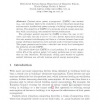Free Online Productivity Tools
i2Speak
i2Symbol
i2OCR
iTex2Img
iWeb2Print
iWeb2Shot
i2Type
iPdf2Split
iPdf2Merge
i2Bopomofo
i2Arabic
i2Style
i2Image
i2PDF
iLatex2Rtf
Sci2ools
HUC
2007
Springer
2007
Springer
An Empirical Study of the Potential for Context-Aware Power Management
Context-aware power management (CAPM) uses context (e.g., user location) likely to be available in future ubiquitous computing environments, to effectively power manage a building’s energy consuming devices. The objective of CAPM is to minimise overall energy consumption while maintaining user-perceived device performance. The principal context required by CAPM is when the user is not using and when the user is about to use a device. Accurately inferring this user context is challenging and there is a balance between how much energy additional context can save and how much it will cost energy wise. This paper presents results from a detailed user study that investigated the potential of such CAPM. The results show that CAPM is a hard problem. It is possible to get within 6% of the optimal policy, but policy performance is very dependent on user behaviour. Furthermore, adding more sensors to improve context inference can actually increase overall energy consumption.
Related Content
| Added | 07 Jun 2010 |
| Updated | 07 Jun 2010 |
| Type | Conference |
| Year | 2007 |
| Where | HUC |
| Authors | Colin Harris, Vinny Cahill |
Comments (0)

